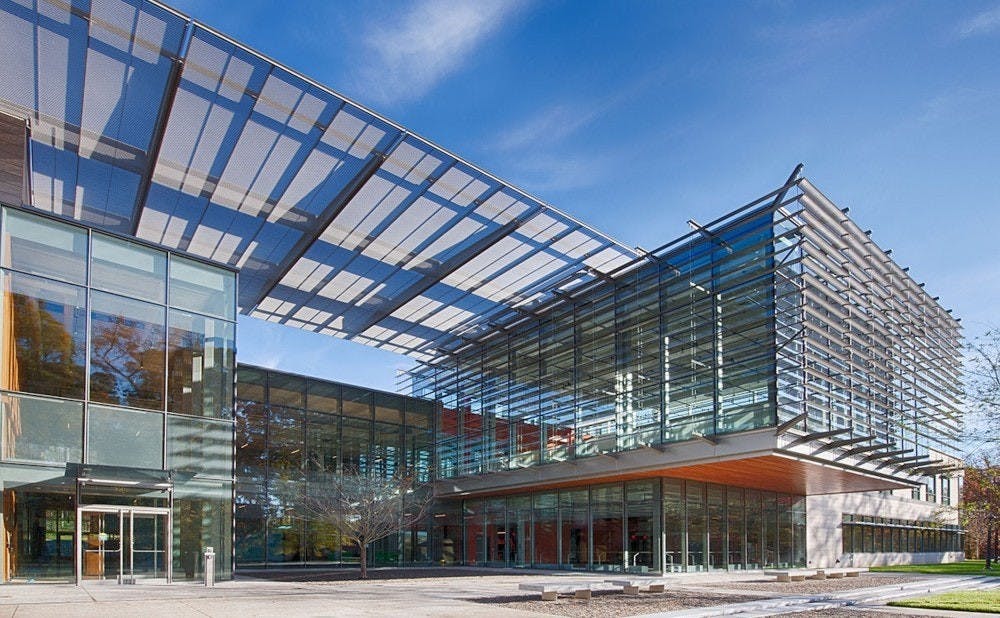Although bookbagging has come and gone, some students spend the first couple weeks of the new semester continuing to shop for courses. Whether you’re considering dropping that chemistry lecture or just want to keep courses on your radar for a future ALP credit, here are some of the most interesting arts-related courses that started on Wednesday.
AMES/MUSIC 190S: K-Pop
Groups like BTS have brought Korean pop music to an international audience in recent years, but the genre known as K-pop has been the subject of academic study since at least the early 2000s. Taught by visiting lecturer Jung-Min Lee, Duke’s course on K-pop — cross-listed in both the Music and Asian & Middle Eastern Studies departments — investigates the “history, production, reception and circulation” of the popular genre.
“K-pop is increasingly regarded as a force that dismantles the duopoly of the U.S. and Western Europe in the global cultural scene,” Lee wrote in an email, citing the concept of the “Korean Wave” or Hallyu, which refers to the proliferation of South Korean culture in the West more generally.
Lee pointed to Hong Kong action movies of the 1970s and ‘80s as another example of an East Asian cultural product that made its way into popular Western culture. Whether K-pop proves to be another fad remains to be seen, but at least for now, K-pop is a force that demands to be critically engaged with, beyond just the music and dance.
“I want my students to understand K-pop as a whole package, not just as a musical phenomenon,” Lee wrote.
ARTHIST/GERMAN 362/LIT 360: What Is Beauty?
Professor Stefani Engelstein’s course will answer — or at least attempt to answer — the age-old question posed by its title. From Plato and Aristotle to Immanuel Kant, philosophers have posed varying definitions of “beauty,” a concept that today is inseparable from dynamics of race, gender and power. Focusing primarily on the evolution of theories of “beauty” in the Western world, the class emphasizes those political ramifications.
“In the Western world, the idea that beauty is in the eye — or mind — of the beholder arose a couple of centuries ago, and it sounds very open and tolerant,” Engelstein wrote in an email. “Judgments of beauty were supposed to be apolitical and unselfish ... and yet, theories of beauty, then and now, establish stark inequalities between sexes and between races, and are obsessed with the political power of purportedly staying out of politics.”
Although Engelstein wrote that she could not promise students would have a definite answer to the question “What is beauty?” by the end of the semester, she hoped that the discussion would help students better understand “the complicated ways we think about beauty in our own lives.”
EDUC/MUSIC/PUBPOL/AAS 290S: The Critical Pedagogy of Hip Hop
While Professor Mark Anthony Neal’s course, “The History of Hip-Hop,” has tended to build up a sizable waiting list with each registration window, another course centered on hip-hop’s role in society — this one taught by Kisha Daniels, an instructor in the Program of Education — takes a look at hip-hop’s relationship with educational instruction.
Using as a framework Paulo Freire’s concept of critical pedagogy, which emphasizes the process of “unlearning,” “re-learning” and reflection in traditional schooling and highlights its political implications, Daniels’s class — which is, in fact, co-taught by Neal — examines hip-hop’s potential role as a “culturally relevant educator,” as Daniels wrote in an email.
For Daniels, whose background is in education leadership, curriculum and instruction, the idea for the course arose from her own experiences in researching innovative strategies for students in marginalized communities. As part of the course — which is connected to a new DukeEngage program being held in Chicago during the summer of 2019 — students will participate in their own service-learning experiences with organizations in the Durham area.
ENGLISH 235: Shakespeare and Feminism
“Shakespeare and Feminism,” taught by Assistant Professor of English Julianne Werlin, updates the study of the classic playwright with a distinctly modern literary perspective. According to the official course synopsis, students will focus specifically on the women represented in Shakespeare’s works and place their experiences in the context of history, society and literature.
In an email, Werlin pointed to characters like Lady Macbeth, Juliet and Cleopatra as examples of Shakespearean women with “powerful influence” in literary studies, highlighting the importance of finding new angles to study feminism alongside Shakespeare today.
“In the current moment, I think people are more receptive than ever to the idea that apparently personal questions of sexuality and identity are deeply and unequally shaped by political and economic structures, and in turn have the most profound implications for them,” Werlin wrote in an email. “I wanted to bring this perception to the understanding of Shakespeare, whose plays brilliantly explore how the possibilities of action and forms of expression open to individuals are constrained by, and often come into conflict with, the wider society in which they’re enmeshed.”
Get The Chronicle straight to your inbox
Sign up for our weekly newsletter. Cancel at any time.

